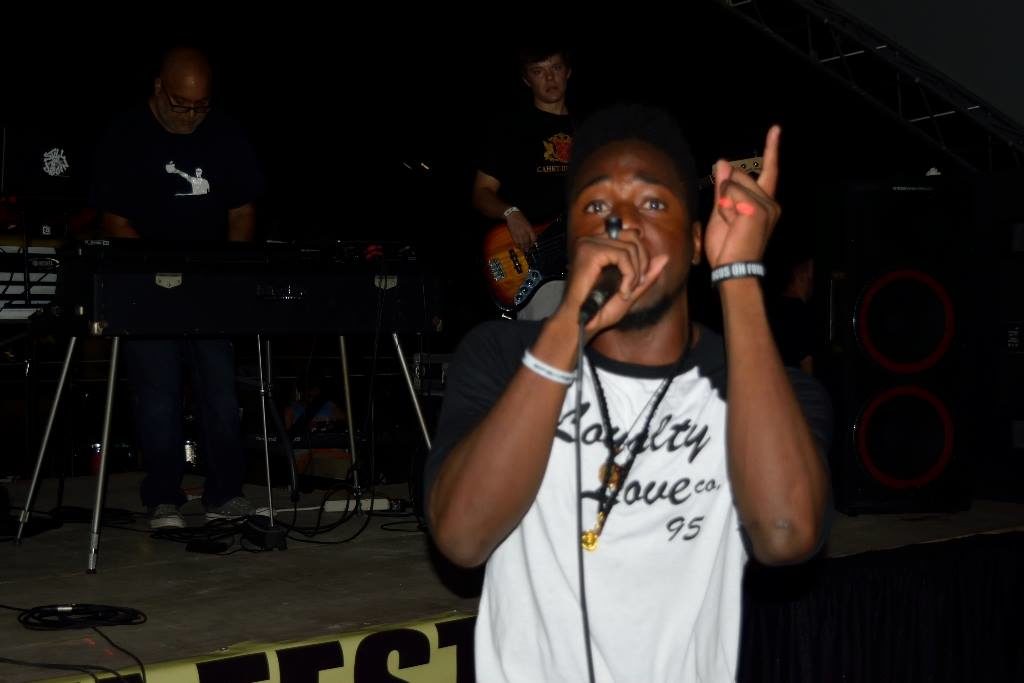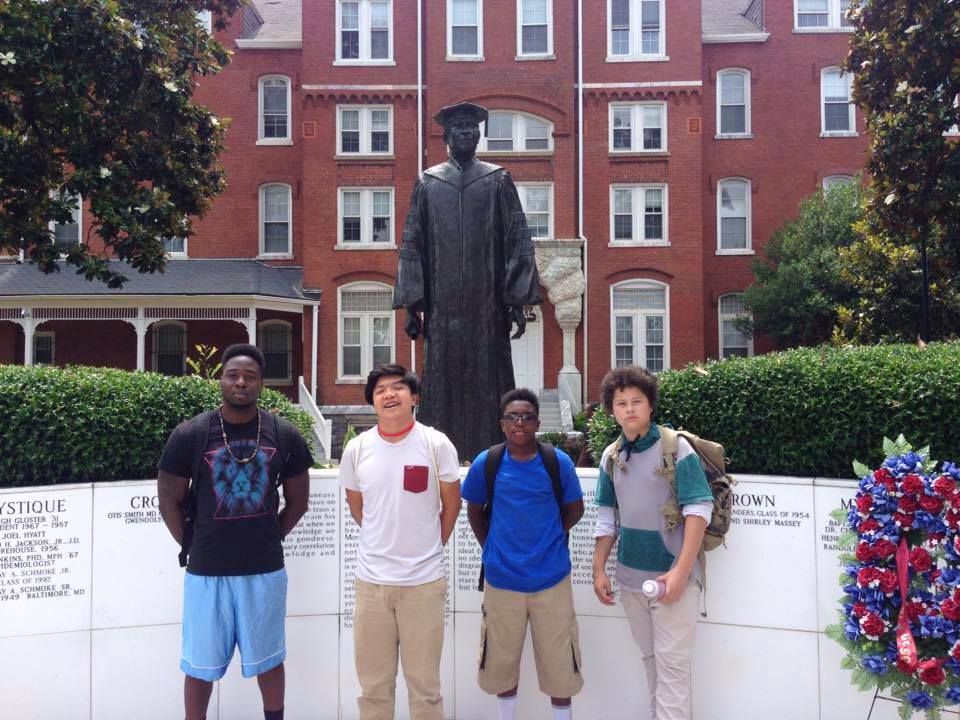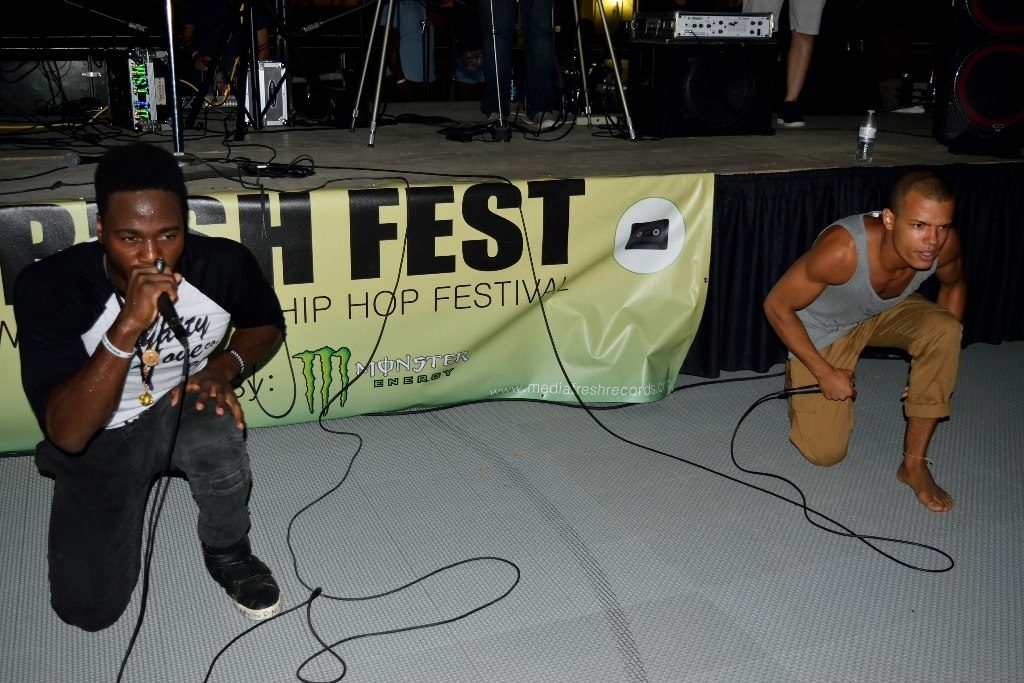Emmett Phillips is a hip-hop artist, teacher, organizer, and Army vet who encourages people to just talk to each other
Emmett Phillips is a hip-hop artist, poet, teaching artist, and United States Armed Forces veteran based in Des Moines. It would be hard to say which of these he would list first on his life’s resume, though it can be said that hip-hop was his first love.
Throughout middle school and high school he got really interested in hip-hop music – not just listening to it, but also making his own. He would go to places with open mic nights where he could test his skills, though he says it was “nothing serious” while he was still in high school.
“I just developed a really deep love for it,” he says. “And I realized it was something I wanted to do further.”

After graduating he wanted a break from school. He had a friend who joined the National Guard and decided to also join as a medic. But all through his training he also remained a hip-hop artist, performing at the basic training graduation ceremony and in downtown San Antonio while stationed at Fort Sam Houston, and even recording seven songs on base, all while excelling at his medic training. Even then, though, he didn’t think music would be his professional future.
“I thought I wanted to be a military doctor,” Phillips says. “I was really good at that. I was just going to keep music as a hobby, but I couldn’t leave it alone. I wanted to keep performing and recording.”
As a lyricist, Phillips writes songs that are socially conscious, informed by (and critical of) what is happening in the world around him. One song he wrote was critical of the government, and he got in trouble for it with the National Guard.
“I was questioning certain things they didn’t want to talk about and they wanted me to take it down. I felt very conflicted about that, but I knew I wanted to spread my truth.”
This happened during his second year in the military. At that time he had also been awarded a full ROTC scholarship, a college-based officer training program. He was halfway through his first semester studying to be a doctor when he received a call telling him that there was no longer any money available for his scholarship – it was October of 2013, and the government had shut down.
“They called me and said they didn’t have the money for my scholarship anymore because of the government shut down. This was my way of paying for school and it wasn’t there anymore,” he recalls. “It gave me some time to reflect on if [medicine] was still something I wanted to pursue.”
The government shutdown lasted only two weeks, but that was enough time for Phillips to do some serious self-reflection. When at the end of the two-week shutdown the scholarship that had been taken away way once again offered to him, Phillips said thanks but no thanks. After having the scholarship given to him, then taken away, then offered back, and all of that after being told he couldn’t make the music he wanted to make, he decided the military life was no longer for him.

“Those two weeks were the hardest two weeks of my life,” he says. “I went super deep into my studies to help me make my decision. I could not wrap my head around how could the government could shut down. I found out the Congress who failed to pass the budget was still being paid while my whole ROTC cadet shut down and were not getting paid. The instructors were not getting paid. I really found a lot of meaning [during that time]. It was one of the toughest but most freeing experiences [of my life], because then I knew I could fully commit to being an agent of change and an agent of truth and that I needed to commit my skills to doing that.”
He took a break from school after that first semester and began searching for “more meaningful” work. He started volunteering at the Boys & Girls Club, where he discovered his love of working with youth, and that eventually turned into a full-time job that allowed him to create his own curriculum. It also allowed him to continue making his music and perform with the Pyramid Theatre Company, the only theatre company in Des Moines that focuses on African American stories.
Since then, Phillips has worked with a number of different creative and cultural organizations, and also began teaching poetry and writing workshops in Des Moines’s public middle schools in conjunction with their urban arts youth program RunDSM.
“This is what I should have been doing all along, but it took me going through all that with the military to realize it,” he explains.

Phillips works with the United States Department of Arts and Culture (a grassroots network of artists, activists, and allies; not a government agency) as a Cultural Agent. With this position he acts as a facilitator hosting story circles and “Imaginings,” arts-centered gatherings that bring together a diverse group of neighbors and use creative practices to open dialogues about their experiences as community members and as citizens of the world, and to also imagine how to harness local artistic talent and cultural resources to create the future they wish to see. Difficult and divisive issues are sometimes posed at these gatherings and people are asked to agree or disagree with certain statements, and then they talk through why Sally chose to agree or Tom chose to strongly disagree.
“Holding those type of events has been really amazing and informative for me,” says Phillips.
He also works with Artists Striving To End Poverty, an organization that connects performing and visual artists to underserved youth in the U.S. to foster critical thinking, awaken imaginations, and end the cycle of poverty. Phillips is Co-President of the ASTEP Leaders Network and President of his local chapter and teaches artist workshops, hosts hip-hop camps, and helps to coordinate the ASTEP Leaders Network around the country, channeling these volunteer artists around different movements in their city to keep them energized and focused so they can keep doing the work that they do.
In May, Phillips also released his first album on streaming services including iTunes and Spotify and has been performing in and around Des Moines. He says that the album, Fear 2 Freedom, is “the culmination of how I’ve been feeling since I left the military with everything that’s gone on up until now.”

The album touches on issues that are close to home for Phillips, from the more general sense of political apprehension in the wake of Trump’s election to more personal experiences of friends being shot and killed, overdosing, or experiencing police brutality. Each track has its own focus, and different people are drawn to different parts of the album based on their own experiences and personal concerns.
Phillips has his own way of addressing social concerns that impact him, not only through his music but also through his organizational leadership and teaching. But for anyone who wants to do something but isn’t sure what, who maybe feels powerless in today’s social and political climate and isn’t sure what to do, he has some very simple advice: talk to people.
“Something I would proscribe that’s really practical that people can act on immediately is holding space for face-to-face dialogue with people who have different views than you,” he says. “I don’t think that’s happening a lot right now. I’ve spoken at universities about racism and dismantling white supremacy to majority white audiences, and what I’ve found out is that a lot of people are more ignorant than they are vicious or hateful. They may just be ignorant [to white privilege and white supremacy] as a white person, rather than knowing and perpetuating it consciously. They’re just existing in a world that’s normal to them.
‘I met some white Vietnam veterans who never knew some African Americans were excluded from receiving benefits from the GI Bill. They had no idea that was happening. It was a shock to them; they didn’t know those types of practices happened. It’s often more ignorance to the issues than malice. But something like Charlottesville is different.
‘I’m more interested in educating people than condemning them for lack of knowledge. Then it’s in their hands to act accordingly from there. There are many more [people out there] who, if they were exposed to the truth in a non-threatening, informative, factual way, can actually be an asset to people trying to change these things.
‘People need to continue to be open to listening to each other. Have conversations in your neighborhoods. Go somewhere with people with different views than yours with an open mind and listen and share your experiences.”

(1) How do you like to collaborate?
I like to collaborate in many different ways. I like to collaborate where I can offer my strengths to any type of platform that is in need of them. I like to be on a team where each person knows their strengths and gets to use them. I like to fit in where I can offer the things I do best for the benefit of a good cause, whether speaking at a university or rap on a song or perform in a play.
(2) How do you a start a project?
If it’s a project I’m leading with some youth I start by finding out what they’re passionate about in the moment. That’s how I start all my projects, with what I’m passionate about at the time and finding out what outlet I want to use for that. They’re always driven by what I’m emotionally motivated by at the time.
(3) How do you talk about your value?
Passionately. I speak about my value based on what I was raised with. I don’t really have new values besides what my patents instilled in me. I have new information to support those values, but my passion for justice and equality comes from how I was raised, and I try to connect with people through that. Everyone has someone in their lives that taught them a value and I like to start with what started at home.
(4) How do you define success?
I would say I define success if I can look at a project or anything I’ve invested energy in and feel a sense of honor about it and feel like my integrity was intact throughout it. Also getting any type of positive feedback from it lets me know that that was a success, no matter how big or small. If only one person says it touched them or helped them open their eyes, then that was a success.
(5) How do you fund your work?
By securing contracts and also having stable employment. I know until I get to a certain point monetary compensation for music is sporadic and will be sporadic for some time, so I take on contracts for teaching at schools. I would recommend artists have and hold down a stable source of income, then branch out and do what they can from there rather than trying to support themselves on their art. Plus I genuinely like the other ways I make money. Even when music is a big source of income for me I’m still going to work with kids and teach because I like it a lot.

Keep up the fire, Emmett